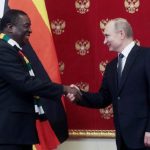Widespread violence and intimidation against opposition campaigners was perpetrated by ZANU-PF supporters across the country, violating Section 67 of the constitution guaranteeing the right to campaign freely and peacefully for a political party or cause. For example: on 2 March a CCC member was severely assaulted in Marondera after putting up opposition campaign posters; on 3 March the home of former MDC Finance Minister, Tendai Biti was attacked by men armed with machetes and his security guard was seriously injured; on 5 March the house of an opposition council candidate was set on fire in Bindura after he had hosted an opposition meeting at the house earlier that day; and on 8 March, Maxwell Dutuma, an opposition council candidate, and a party colleague were attacked by ZANU-PF supporters in Highfields. Both were injured, his colleague very seriously. When Maxwell Dutuma reported the assault to police he was arrested. Most egregiously, on Saturday 26 February, Vice-President Chiwenga openly incited violence against the opposition at a rally in Kwekwe saying: “You see how we crush lice with a stone. You put it on a flat stone and then flatten it to the extent that even flies will not make a meal out of it. That is what we are going to do to CCC.”
ZANU-PF thugs understood that message only too well and the following day attacked an opposition rally in the same city with iron bars and machetes. An opposition supporter was killed, and many others were seriously injured.
These are just a few examples of the numerous incidences of intimidation, violence, voter roll irregularities and serial violations of the law and the constitution that took place during the election campaign. I put them on the record here so that there is an understanding of the level and extent to which the constitutional rights of Zimbabweans were violated by their own Government and in the hope that, ahead of the 2023 general elections, the international community and, most particularly, countries in the region will engage with Zimbabwe’s Government to persuade them to uphold the constitution and the right of the people to freely choose their leaders.
However, the UK’s strategy in the region must be about much more than criticism of a particular Government or their actions. It must be born of a real desire to engage positively with people—particularly young people—business and SADC Governments on a shared approach to tackling the challenges they face and supporting economic development in a way that lifts the poor rather than simply further enriches the wealthy. That means a real commitment from our Government to meaningfully engage and a real understanding of how our disengagement to date has left a gap which is rapidly being filled by both China and Russia.
Finally, we must have some self-awareness about the ramifications of actions at home on our ability to argue for values abroad. Last night, for example, we in the House of Lords debated the Government’s attempts to strip our own Electoral Commission of its independence by giving Ministers the right to issue it directions. What signal do we think that sends to would-be autocrats around the world seeking to suborn their own electoral commissions? What signal do we think it sent to people in the Southern African Development Community region when, immediately following free elections in Zambia and a peaceful transfer of power, we slashed our development assistance to that country by over 50%? What lessons do we think SADC Governments took from our hoarding of vaccines as China supplied theirs, or from our continued blocking of the TRIPS waiver? Words matter, but actions matter even more.
Continued next page
(590 VIEWS)



Pingback: Zimbabwe tells Britain to mind its own business | The Insider